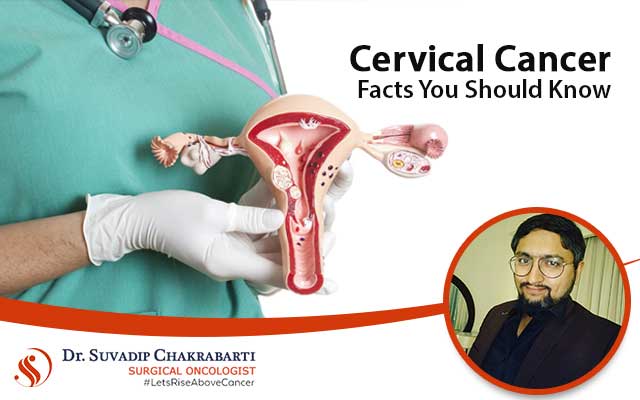Cervical cancer is a form of cancer that develops in the cells of the cervix, which connects the uterus to the vaginal canal. Most cervical cancer is caused by different strains of the human papillomavirus (HPV), a sexually transmitted infection, says Dr. Suvadip Chakrabarti, who is considered to be the best gynae oncologist in Kolkata. Cervical cancer is among the most commonly occurring cancers in Indian women, second to breast cancer. In India, 96,922 women are diagnosed with cervical cancer each year, with 60,078 dying as a result of the disease. Here are some specifics about this disease, as well as information about how to avoid it and treatment options.
Symptoms of Cervical Cancer
Irregular menstrual bleeding, bleeding after sexual activity or in between periods, postmenopausal bleeding, and foul-smelling vaginal discharge are all symptoms. According to the cancer specialist in Kolkata, low back pain and lower abdominal pain are common in women.
Importance of Screening
The lack of knowledge of cervical cancer and the lack of cervical screening are two major factors contributing to the high incidence of the disease in India. Cervical changes can be detected by screening before cancer grows. It can even detect cervical cancer early on when it hasn’t spread and is still treatable. Many forms of cervical cancer are diagnosed in advanced stages due to a lack of screening, resulting in high mortality rates.
What can You do to Protect Yourself from Cervical Cancer
Consult the experienced gynaecologic oncologist in Kolkata, who will perform a detailed pelvic examination and explain the cervical screening tests, such as the Pap test and HPV DNA test. Every three years, women aged 21 to 29 should have a Pap examination.
After the age of 30, the preferred method of screening is to have a Pap test paired with an HPV test every 5 years (co-testing), or every 3 years with a Pap test, until the age of 65.
Suppose your Pap and/or HPV test results are abnormal. In that case, you could be referred for further testing, which may include a colposcopy (an illuminated, magnified image of the cervix) and a biopsy.
Diagnosis of Cervical Cancer
A full physical examination and a cervical biopsy, in which the cancer doctor in Kolkata takes a small tissue sample from the cervical growth to confirm a malignancy, are needed for the diagnosis of cervical cancer. In addition, radiological imaging (MRI/CT/PET-CT) is recommended to check for disease transmission, if any exists.
Treatment of Cervical Cancer
The cervical cancer treatment is determined by the stage of the disease. Dr. Chakrabarti, a renowned surgical oncologist in Kolkata, recommends patients with early-stage cancer and good general health undergo surgery through which the uterus and cervix, as well as the lymph glands in the pelvis, are extracted (radical hysterectomy).


